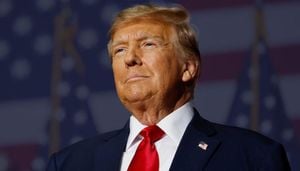The dynamics of transatlantic relations have shifted yet again as Donald Trump returns to the fold, soon to step back behind the desk of the White House. The repercussions are being felt across Europe, with key leaders re-evaluing their security strategies and defense postures. Nancy Pelosi’s recent reflections serve as backdrop to this recalibration; as the Senior Democrat noted, America’s commitment to NATO allies may encounter serious challenges.Demands from European leaders for increased defense spending are echoed by long-held frustrations with the U.S. stance, particularly following Trump’s previous presidency which was characterized by his call for European nations to shoulder more of their defense costs. Emmanuel Macron, the French President, recently remarked at a NATO summit, urging Europe to not only shore up its own defenses but also articulate independent strategies. During this discussion, he summarized the crux of the matter, stating, "Nothing should be decided about Ukraine without the Ukrainians, nor about Europe without the Europeans."
This sentiment emphasizes with poignant clarity the necessity for Europe to bolster its homegrown military capabilities, especially with the specter of Russia looming ever larger. The return of Trump reignites the need for collective investment within Europe for its own defense, which many believe was long overlooked during prior U.S. administrations. Macron's emphasis on this notion resonates deeply amid the realization among European leaders: reliance on U.S. military support has limits and entails risks, particularly if U.S. foreign policy shifts toward isolationism. Prime Minister Rutte of the Netherlands articulated his stance passionately, spotlighting the geopolitical escalations involving North Korea, Iran, and Russia, emphasizing how intertwined the threats to Europe’s security truly are. “Russia, working together with North Korea, Iran and China, is not only threatening Europe, it threatens peace and security,” he warned.
Trump’s restoration to power had already triggered discussions within European circles about drawing closer to one another and recalibrations for potential scenarios. The extent to which Brussels may embrace this opportunity, as discussed by Both German and French leaders, is indicative of broader strategic realignments. One notable agenda discussed was the long-overdue prioritization of defense spending and collective strategies aimed at thwarting external autocratic pressures, such as those from Russia and China. With Russia’s actions providing both peril and clarity of mission, the momentum for action appears to be gaining traction.
Nonetheless, European leaders like Kaja Kallas, Estonia’s Prime Minister, and her peers have underscored the necessity for Europe to remain steadfast as U.S. foreign policy priorities appear to shift. During her appointment hearing, Kallas fervently noted the importance of Ukraine's victory and posited the notion to leverage frozen Russian assets held within Europe to finance necessary support. “If we create alternatives to NATO, it would be just confusing when the real conflict hits,” she asserted, reflecting the challenges associated with ensuring effective coordination between transatlantic partners.
Beyond the Ukraine question, other matters such as potential tariffs and defense spending loom large over discussions on how to build deterrence frameworks capable of addressing global threats. There’s also the looming specter of Brexit's aftermath intertwining with transatlantic strategies. The Biden administration’s stance on the relationship between Britain and the EU will evolve; Trump might invoke past sentiments which would benefit broader negotiations concerning trade harmonization. Concerns linger about whether the UK might need brace itself for potential shifts as Trump reignites American First posturing.
Conversations among European diplomats paint pastures of cautious optimism surrounding closer ties between the UK and EU, driven by desires to navigate the waters of potential tariff escalations whilst fostering greater military cooperation. This emphasis on multilateralism seeks partnership rather than isolation, shifting old paradigms. These discussions tap deeply back to post-Brexit realities with the EU leveraging newfound relationships with Britain to maximize mutual benefits.
Shifting gears, it’s become evident through various diplomatic channels and discussions among leaders, like Kemi Badenoch, the Conservative opposition leader, advocating for the UK to maintain firm ties to Washington. She casts herself as the voice advocating continuity and stability akin to historic alliances. Looking back, Trump's ascension to the presidency brought with it the pressure to recalibrate these ties. Talks simmering on defense and foreign policy indicate vulnerabilities potentially addressed. EU officials echo these sentiments; the goal lies within acquiring unique positions at the negotiating table.
This push from Europe’s leading figures related to bolstered defense investments and managing tariffs on strategic partnerships figures prominently as one heady reckoning for all who are guided not only by domestic interests but also broader consensus with allies, including the United States. The EU aims for methods to unify military efforts, aiming for collective security on independent terms when contingency calls.
Trump’s approach to trade deals markedly influences these calculous as it sends tremors across marketplaces. A common refrain is the calling for unique ties among allies to facilitate cooperation. On the other hand, many European nations worry about costs of enhanced security and pressing trade disputes, fickle political circumstances tying their approaches together.
Many European leaders may hope to maneuver through the looming hurdles Trump presents by positioning themselves as reliable allies. But how to sustain leadership, ensuring mutual defense pacts and active collaboration? This is where the rubber meets the road; cooperation must translate to collaborative approaches rooted deep within essentials of global alliances alongside burgeoning client-state relationships.
The shifts felt extend deeply to the economic ties between the U.S. and the European economy; tariffs and regulations under scrutiny are topics joined at the hip with the like-minded NATO project. Each factions attempts at independence touch on their interconnected nature. If the Biden administration shifts dramatically away from Europe, encouraging Trump-esque approaches, burgeoning vulnerabilities may emerge once again. This calls for dialogues such as those initiated at recent European summits, weighing potential impacts carefully through the eyes of those striving for sustainable partnerships.
Indeed, the stage set brings together thoughts, ideas on transatlantic partnerships alongside shared historical contexts. The necessity for continual action remains pivotal. The resounding calls from leaders across the spectrum resonate universally, ushering forth objectives aligning with security, trade aspirations, and representing the sustainability of these historical allegiances amid the uncertainties reigning around Trump’s re-election, easing the narrative of shared partnerships,” concluded Macron.



